Last Updated on November 14, 2025
In the UK, the average lifespan of a boiler is typically 10 to 15 years, depending on the model and how well it’s maintained. With regular servicing and proper care, many boilers can last beyond 15 years, ensuring reliable heating and efficiency. To maximize your boiler’s life, schedule annual maintenance checks and address any issues promptly.
We’re here to guide you through the factors affecting your boiler’s longevity and what to do when it’s reaching the end of its days. From maintenance tips to some of the best eco-friendly boiler alternatives – we’ve got you covered!
Contents
Factors Affecting Boiler Lifespan
While the average lifespan of a boiler is 10 to 15 years, several factors influence its actual longevity:
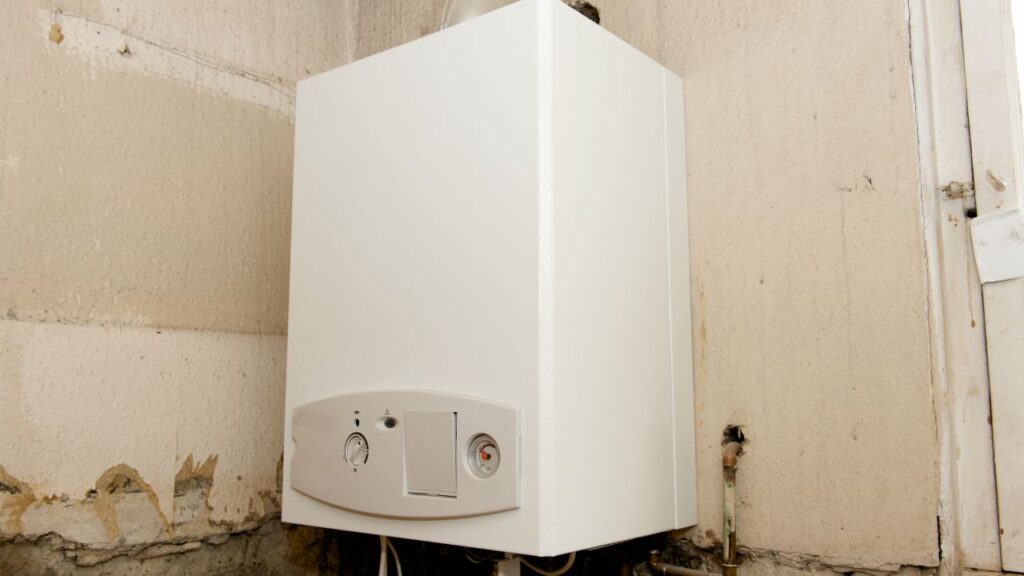
Type of boiler
First things first: understanding the type of boiler you have is very important. Different boiler models have varying lifespans due to their unique designs and operation.
Let’s take a quick look:
- Combi boiler: A combi boiler is an efficient boiler and central heating system in one compact unit with a life expectancy of around 12 to 15 years. This is due to their combined heating and hot water functionality which puts additional strain on internal components and mechanisms.
- System boiler: These heating devices work alongside a separate hot water cylinder and generally last for around 15 years.
- Regular boiler: These traditional boilers are older, consisting of a hot water cylinder and a separate water storage tank. These have the longest lifespans of between 15 and 20 years.
Want to know more about a system boiler vs a combi boiler? Read our comprehensive guide.
Maintenance frequency
Having your boiler serviced annually by a Gas Safe registered engineer is crucial to keep it in tip-top condition. During boiler services, these trained professionals will:
- Inspect the condition of your boiler; looking for signs of water leaks, wear, and tear and potential operational issues.
- Remove any built-up limescale and debris hindering your boiler performance.
- Adjust boiler settings to ensure it operates at peak performance, preventing costly breakdowns and extending its lifespan significantly.
Not servicing your boiler regularly can impact its performance drastically, resulting in frequent breakdowns and costly repairs. This directly translates to shorter lifespans.
Usage patterns
Excessive usage can put stress on your boiler, particularly if it’s running full-tilt 24/7. For optimal operation and longevity, you need to strike a balance between heating comfort and responsible use. This can be done in the following ways:
- Maintain consistent room temperatures by avoiding frequent adjustments.
- Don’t leave your boiler and heating system on permanently, even during chillier months.
- Refer to your boiler manufacturer leaflet for recommended usage times and patterns.
Bonus tip: Find out how many hours a day your heating should be on, on Eco Happy’s website.
Water quality
Hard water with a higher mineral content can negatively impact your boiler’s lifespan. These minerals solidify and cause limescale deposits on vital internal mechanisms, hindering efficiency and heating ability.
Limescale acts as an insulator that affects the heat transfer within your boiler and heating system. This leads to increased energy bills and premature malfunctions of crucial components.
Next, we’ll explore the signs that your boiler might be on its last legs and when it might be time for a replacement.
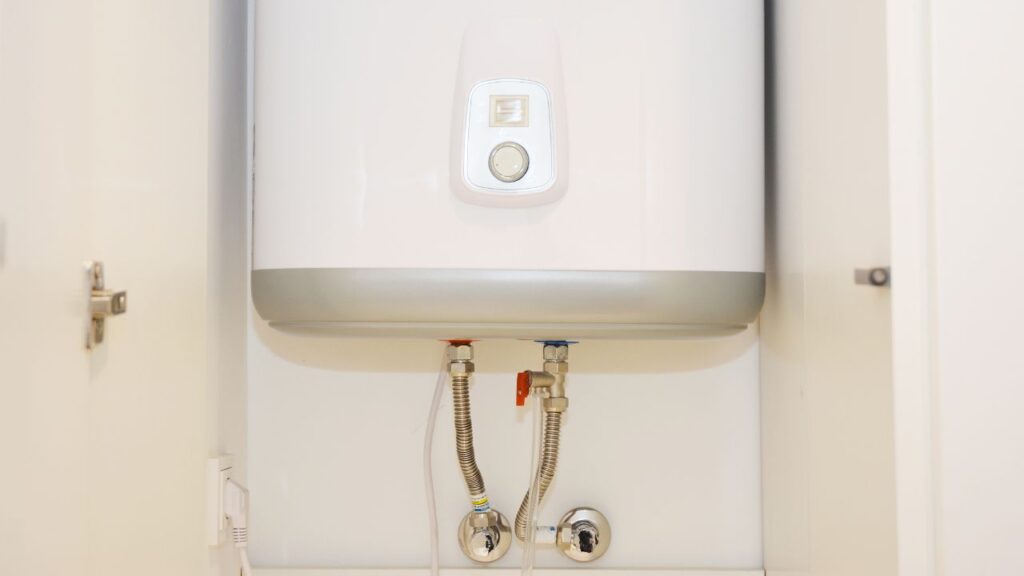
7 Signs Your Boiler Needs Replacing
While a well-maintained boiler can provide years of reliable heating, even the most hardy units will eventually start acting up.
Recognising the signs of an ageing boiler can help you plan for a smooth and timely replacement, ensuring your home’s warmth and hot water is unaffected.
Here’s a list of seven telltale signs that it’s time to kick your old boiler to the curb:
1. Frequent breakdowns
If your boiler is experiencing frequent breakdowns or regularly requires repairs (more than once a year), it’s likely time for a boiler replacement.
2. Erratic temperature fluctuations
When boilers struggle to maintain a consistent temperature within your home – with frequent hot and cold spells – it could indicate your boiler is malfunctioning. This is particularly common with older models.
3. Water leaks
Visible water leaks around the boiler unit and/or surrounding components, such as radiators or pipework, are a serious concern. While minor leaks can be repaired, persistent water seepage signals your boiler needs replacing.
4. Low performance
If your boiler is no longer heating your home effectively, taking longer to heat your radiators, or requires constant adjustments, it could be a sign of declining performance – and time for a new boiler!
5. Unusual smells or strange noises
Strange odours coming from the boiler, especially if they resemble gas or burning smells, could indicate a serious issue like a gas leak or improper combustion. This needs immediate attention and a boiler replacement is likely due.
If your boiler is making strange noises, like banging, whistling or hissing, it’s best to call a Gas Safe engineer for a full boiler analysis and replacement.
6. Increased energy bills
If you notice increased heating bills without a logical explanation, it indicates your boiler is losing efficiency. This is often caused by general wear and tear or limescale buildup, making it harder for your boiler to perform at optimum efficiency.
7. Age of the boiler
As mentioned, boilers typically have a lifespan of 10 to 15 years. If your old boiler is reaching this milestone and showing signs of inefficiency or frequent issues, it’s time to replace it.
Additionally, if there are external signs of corrosion or damage to your boiler, it could indicate internal damage and a higher risk of system failure.
If you notice any of these signs, you must contact a qualified Gas Safe engineer. They can assess the problem and recommend the best course of action, whether it’s repair or time for a new boiler installation.
Bonus tip: If you’re wondering how old your boiler is, read Eco Happy’s article for more information.
Now that we know what boiler problem signs to look out for, let’s move on to how you can extend the lifespan of your boiler.
Extending The Life Of Your Boiler
Investing in regular boiler maintenance is key to ensuring that it not only functions efficiently but also gives you a few extra years.
By implementing these steps proactively, you can prevent costly breakdowns and repairs, and ensure your home remains warm and toasty.
Here are a few boiler maintenance tips:
Annual services
How often should a boiler be serviced?
- Schedule an annual boiler service with qualified heating professionals to ensure the optimal efficiency of your boiler and heating system.
- These professionals will identify potential problems before they cause major issues.
- They’ll start with a visual inspection of the exterior boiler unit, followed by an internal inspection of boiler components such as the heat exchanger, valves and seals. Thereafter, they’ll perform several operational examinations like pressure and safety valve tests, and thermostat checks.
Bleed radiators
- Radiators become blocked with trapped air and debris over time, affecting their heating and transfer abilities.
- Bleeding your radiators once a year removes trapped air and sludge, ensuring optimal heating system performance and reducing strain on your boiler.
Use inhibitors and filters
As mentioned, a hard water supply contributes significantly to limescale deposits. These deposits reduce the efficiency of our boilers and can cause premature component malfunctions and boiler failure. Our advice is to:
- Run a central heating inhibitor (cleaner) through your system at least once a year to prevent scale buildup. These chemical products protect vital components and prolong your boiler’s life. Check out our article to discover the best central heating inhibitors.
- Consider installing a magnetic filter. These filters are designed to capture iron oxide (rust) particles and other suspended debris before they clog boiler and heating systems.
Do boiler checks
- Check your boiler, radiators, and central heating system at least once a month to ensure that all vital mechanisms are in good working order.
- These checks include:
- Thermostat/temperature readings
- Pressure gauge – the ideal range for most boilers is between 1 and 2 bars
- Condensate pipes (i.e. wastewater outlet)
- Radiators
Implementing these simple yet effective tips into your annual routine can significantly increase your boiler’s life expectancy.
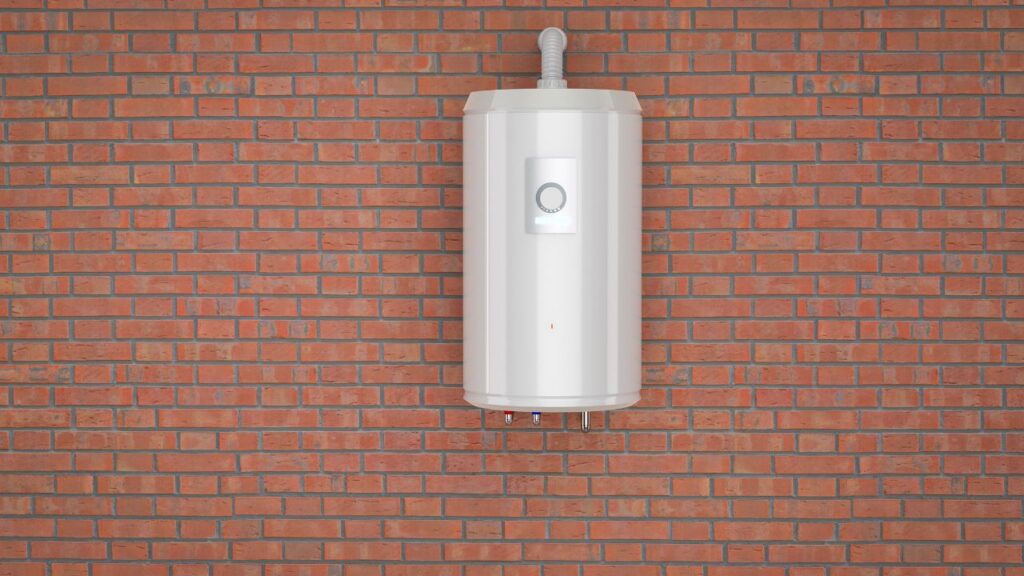
Boiler Replacement Tips
As mentioned, even the best-maintained boilers eventually reach the end of their days, signalling it’s time to have a new boiler installed.
Replacing an older boiler with a newer, efficient model can make your home more comfortable and provide energy savings (more on that later).
UK heating schemes
The UK Government has several heating schemes available for eligible households. These schemes provide funding, making the transition to a new energy-efficient boiler more affordable. These include:
- Boiler Upgrade Scheme (BUS) – £3.9 billion worth of funding available
- Warmer Homes Scotland
- ECO4 – ending 31 March 2026
The government’s stance on new boilers
The UK Government plans to phase out gas and oil boilers – for new builds – as early as 2025 as part of its efforts to achieve net zero emissions by 2050.
The Net Zero Strategy plans to decarbonise all sectors of the UK economy with the help of low-carbon heating systems. For example, heat pumps are becoming popular home heating solutions across the UK and they are heavily advocated by energy warriors.
What this means for the average homeowner is that you’ll need to replace your boiler, whether it’s an oil or gas boiler, with eco-friendly solutions like heat pumps or electric boilers to remain compliant.
With these factors in mind, you’re equipped to make better boiler choices when it’s time for a replacement.
How To Choose A New Boiler For UK Homes
Choosing a new boiler is never easy. Various factors like the size of your home, which boiler suits your needs, and which fuel type you choose must be considered. Luckily, we’ve made this easy for you:
Size of your home
Boiler sizes are measured in kilowatts (kW) and need to match the size of your home and your heating demands. Choosing a size too small will struggle to meet your heating needs, while an oversized boiler leads to wasted energy and higher energy bills.
Use our boiler size calculator to find out what size you need.
Which type suits your needs
We’ll briefly touch on the three main types of boilers in the UK:
- Combi boilers are space-saving champions and are ideal for 2- to 3-bedroom homes with 1 to 2 bathrooms. They’re efficient boilers and central heating systems in one compact unit.
- System boilers need a bit more space than combis, as they need a separate hot water cylinder. These are best for larger homes (3+ bedrooms) with 2+ bathrooms. They can provide a consistent hot water supply to multiple outlets.
- Regular or conventional boilers are the bulkiest of these three due to the need for both a hot water cylinder and a water storage tank. These old boiler models are often used on large properties with high heating demands or in areas with low water pressure.
Bonus tip: For the best boiler for 3-bed homes, check out our article.
Boiler alternatives
As the UK forges toward cleaner energy solutions, heat pumps are gaining popularity as a green alternative to traditional boilers. Heat pumps transfer air from one area to another which significantly lowers energy consumption, resulting in a smaller carbon footprint.
Read more about heat pump running costs on our website and step into the energy-efficient era!
Consulting a heating engineer is crucial when considering alternative heating methods as they will be able to align your needs, budget, and the UK’s future energy goals.
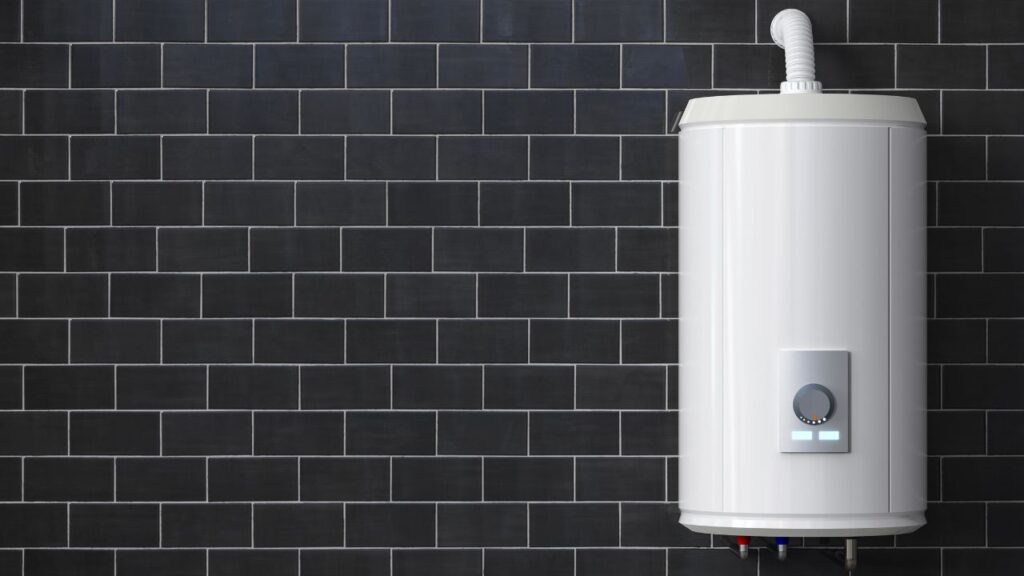
Importance Of Professional Services
By now you should know how important it is to have your boiler serviced regularly, but a quick reminder doesn’t hurt! Services are a must if you want your boiler to last.
- Safety: Ensures new boilers are installed safely
- Efficiency: Qualified technicians ensure boilers and heating systems operate at peak performance
- Warranties: Most boiler manufacturers require qualified Gas Safe engineers to service and install boilers; without it the warranty is void.
- Peace of mind: Having your current boiler replaced by a qualified professional gives you peace of mind knowing it is installed properly. This ensures its longevity for many years to come.
Contact Eco Happy
As the UK’s leader in boiler installation, repair, and maintenance, Eco Happy is the team you want on your side. Our skilled heating technicians make boiler replacements a breeze and are equipped to tackle the toughest boiler longevity challenges.
When looking for fast, reliable boiler services – and advice on your boiler life expectancy – contact us today!
FAQs
Can a boiler last 30 years?
While it’s not impossible for boilers to last 30 years when properly maintained, it’s their efficiency that is the concern.
Older boilers are less efficient than modern boilers, making them more expensive to run in the long term. You might also experience frequent breakdowns or repairs which makes a newer boiler a more cost-effective solution.
What do I do when my boiler is faulty?
If your boiler is faulty, or you suspect it’s time for a replacement, contact professional heating engineers for a full boiler analysis. These experts will recommend any repairs or replacements needed.
Do I need to replace my boiler if it is leaking?
While water leaks do not necessarily mean you need to replace your boiler, they are a serious concern. Ageing boilers tend to break down more frequently than newer models, with water leaks being a common sign. It’s best to call professional boiler technicians – like Eco Happy – for assistance.
Final Thoughts
A reliable boiler is the star player in your home’s heating system, providing warmth and comfort, especially in colder seasons.
While a well-maintained boiler can last for years, understanding its lifespan and potential issues can help you plan for replacements and ensure your heating system continues to function efficiently.
Remember, regular servicing is crucial for extending your boiler’s lifespan, and replacing an ageing or inefficient boiler can save you money on energy bills in the long run.
When it comes to boiler installation and maintenance, professional services – like Eco Happy – offer significant benefits, ensuring safety, optimal performance, and peace of mind.
Are you ready to ensure your home’s comfort and safety with a reliable boiler system? Then chat with the Eco Happy team today.
Our team of qualified engineers can provide professional advice when a boiler replacement is needed, service your existing boiler, or guide you through the process to find the perfect solution for your needs.
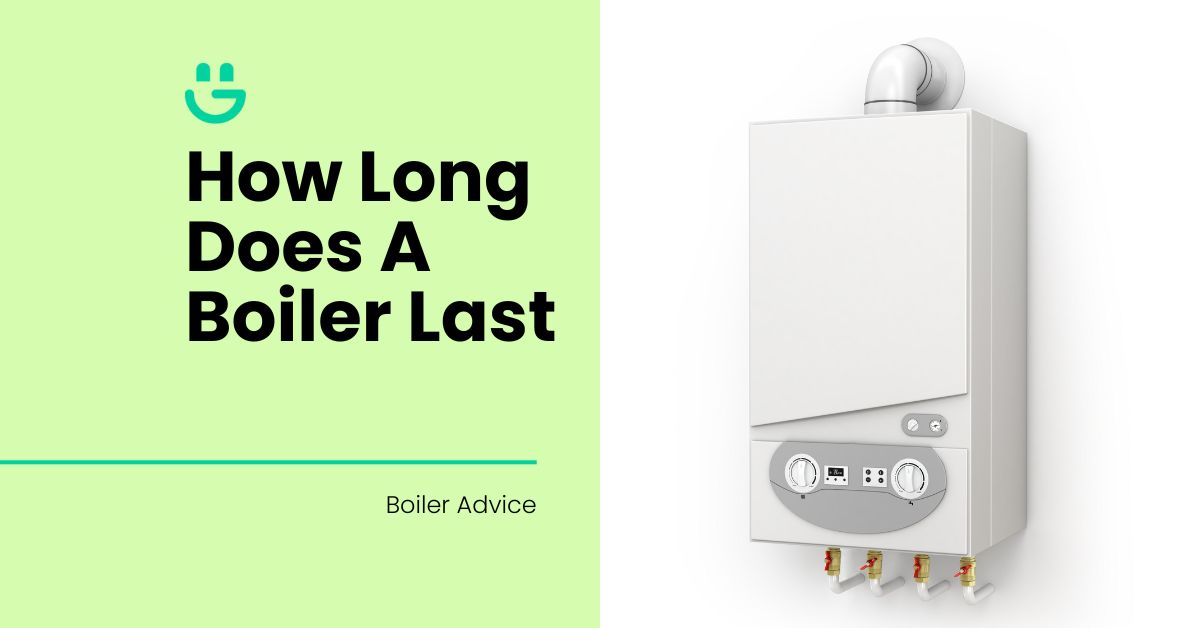





Tom Allen
Solar Expert